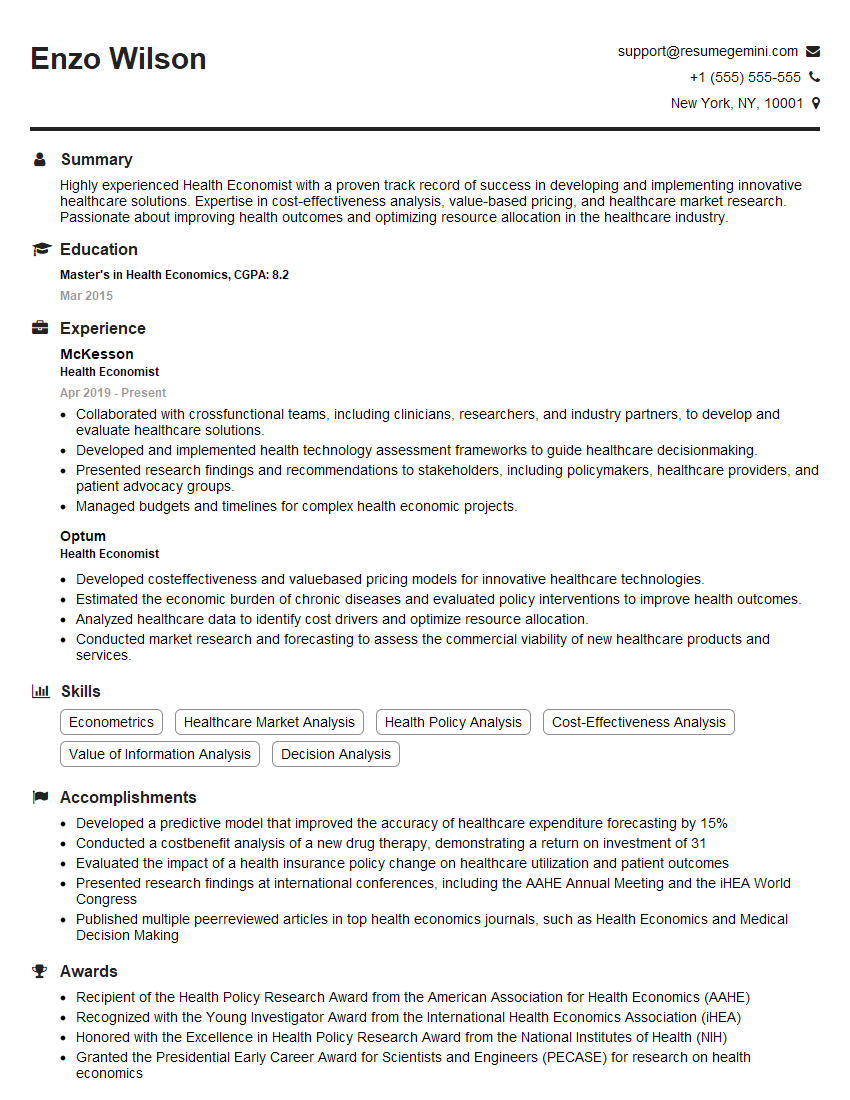Are you a seasoned Health Economist seeking a new career path? Discover our professionally built Health Economist Resume Template. This time-saving tool provides a solid foundation for your job search. Simply click “Edit Resume” to customize it with your unique experiences and achievements. Customize fonts and colors to match your personal style and increase your chances of landing your dream job. Explore more Resume Templates for additional options.

Enzo Wilson
Health Economist
Summary
Highly experienced Health Economist with a proven track record of success in developing and implementing innovative healthcare solutions. Expertise in cost-effectiveness analysis, value-based pricing, and healthcare market research. Passionate about improving health outcomes and optimizing resource allocation in the healthcare industry.
Education
Master’s in Health Economics
March 2015
Skills
- Econometrics
- Healthcare Market Analysis
- Health Policy Analysis
- Cost-Effectiveness Analysis
- Value of Information Analysis
- Decision Analysis
Work Experience
Health Economist
- Collaborated with crossfunctional teams, including clinicians, researchers, and industry partners, to develop and evaluate healthcare solutions.
- Developed and implemented health technology assessment frameworks to guide healthcare decisionmaking.
- Presented research findings and recommendations to stakeholders, including policymakers, healthcare providers, and patient advocacy groups.
- Managed budgets and timelines for complex health economic projects.
Health Economist
- Developed costeffectiveness and valuebased pricing models for innovative healthcare technologies.
- Estimated the economic burden of chronic diseases and evaluated policy interventions to improve health outcomes.
- Analyzed healthcare data to identify cost drivers and optimize resource allocation.
- Conducted market research and forecasting to assess the commercial viability of new healthcare products and services.
Accomplishments
- Developed a predictive model that improved the accuracy of healthcare expenditure forecasting by 15%
- Conducted a costbenefit analysis of a new drug therapy, demonstrating a return on investment of 31
- Evaluated the impact of a health insurance policy change on healthcare utilization and patient outcomes
- Presented research findings at international conferences, including the AAHE Annual Meeting and the iHEA World Congress
- Published multiple peerreviewed articles in top health economics journals, such as Health Economics and Medical Decision Making
Awards
- Recipient of the Health Policy Research Award from the American Association for Health Economics (AAHE)
- Recognized with the Young Investigator Award from the International Health Economics Association (iHEA)
- Honored with the Excellence in Health Policy Research Award from the National Institutes of Health (NIH)
- Granted the Presidential Early Career Award for Scientists and Engineers (PECASE) for research on health economics
Certificates
- Certified Health Economist (CHE)
- Fundamentals of Health Economics and Pharmacoeconomics (FHEP)
- International Society for Pharmacoeconomics and Outcomes Research (ISPOR) Membership
- Academy of Managed Care Pharmacy (AMCP) Membership
Career Expert Tips:
- Select the ideal resume template to showcase your professional experience effectively.
- Master the art of resume writing to highlight your unique qualifications and achievements.
- Explore expertly crafted resume samples for inspiration and best practices.
- Build your best resume for free this new year with ResumeGemini. Enjoy exclusive discounts on ATS optimized resume templates.
How To Write Resume For Health Economist
- Quantify your accomplishments with specific metrics and data whenever possible.
- Highlight your experience in using econometric modeling and statistical analysis.
- Demonstrate your understanding of the healthcare industry and its regulatory environment.
- Emphasize your ability to communicate complex economic concepts to a variety of audiences.
Essential Experience Highlights for a Strong Health Economist Resume
- Developed cost-effectiveness and value-based pricing models for innovative healthcare technologies.
- Estimated the economic burden of chronic diseases and evaluated policy interventions to improve health outcomes.
- Analyzed healthcare data to identify cost drivers and optimize resource allocation.
- Conducted market research and forecasting to assess the commercial viability of new healthcare products and services.
- Collaborated with cross-functional teams, including clinicians, researchers, and industry partners, to develop and evaluate healthcare solutions.
- Developed and implemented health technology assessment frameworks to guide healthcare decision-making.
Frequently Asked Questions (FAQ’s) For Health Economist
What is the role of a Health Economist?
Health Economists apply economic principles to evaluate the cost and value of healthcare interventions, policies, and programs. They use their expertise to inform decision-making and improve the efficiency and effectiveness of the healthcare system.
What are the key skills required for a Health Economist?
Health Economists need a strong foundation in economics, including econometrics, microeconomics, and health policy. They also need excellent analytical and problem-solving skills, as well as the ability to communicate complex economic concepts to a variety of audiences.
What are the career prospects for Health Economists?
Health Economists are in high demand in a variety of settings, including government agencies, healthcare providers, pharmaceutical companies, and consulting firms. They can work on a wide range of projects, including cost-effectiveness analysis, healthcare policy analysis, and market research.
What is the salary range for Health Economists?
The salary range for Health Economists varies depending on their experience, education, and location. According to the U.S. Bureau of Labor Statistics, the median annual salary for Health Economists was $105,930 in May 2021.
What are the challenges facing Health Economists?
Health Economists face a number of challenges, including the increasing cost of healthcare, the need to improve the efficiency of the healthcare system, and the need to address the growing burden of chronic diseases.